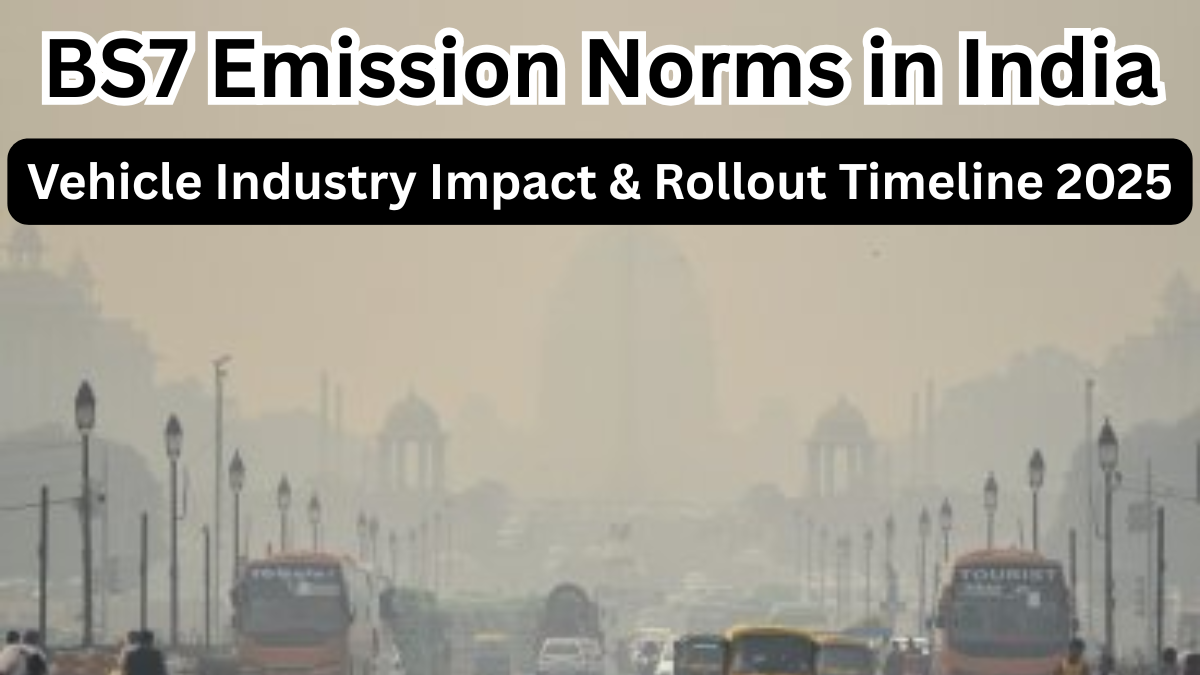India is gearing up for another bold move in its fight against vehicular pollution. After implementing BS6 standards in 2020, the country is now setting the stage for BS7 norms India, expected to roll out in 2025. But what exactly does this mean for car owners, manufacturers, and the environment?
Let’s simplify it for you.

What Are BS7 Emission Norms?
The BS (Bharat Stage) emission standards are regulation guidelines set by the Indian government to control air pollutants from motor vehicles. These standards are in sync with Euro norms.
BS7 is the upcoming stage in this sequence, aimed at making Indian vehicles even cleaner and greener.
Key Highlights of BS7 Norms India
-
Stricter controls on nitrogen oxide (NOx), particulate matter (PM), and carbon monoxide (CO) emissions
-
Introduction of real driving emission (RDE) monitoring on a broader scale
-
Focus on hybrid and electric vehicle integration
-
Use of On-Board Diagnostics (OBD) 3 systems for real-time emission tracking
Rollout Timeline for BS7 Norms
| Milestone | Expected Timeline |
|---|---|
| Draft policy announcement | Mid-2024 |
| Stakeholder consultations | Late 2024 |
| Final policy rollout | Early 2025 |
| Industry compliance deadline | Mid to late 2025 |
| Consumer-level implementation | Late 2025 – Early 2026 |
Why BS7 Norms Matter – The Environmental Context
India is battling rising urban pollution. Vehicles are a major contributor to poor air quality in cities like Delhi, Mumbai, and Bengaluru.
How BS7 Helps
-
Reduces toxic emissions from vehicles
-
Encourages greener vehicle technologies
-
Promotes sustainable urban transport
-
Aligns India with global emission standards update efforts
How Will BS7 Norms Affect the Automobile Industry?
The introduction of BS7 norms in India is a game-changer for the auto sector.
Impacts on Manufacturers
-
Increased R&D investment for compliant engines
-
Shift towards electric and hybrid vehicles
-
Higher vehicle costs due to upgraded tech
-
Faster phasing out of older, non-compliant models
Impacts on Consumers
-
Expect higher prices for BS7-compliant vehicles
-
Better fuel efficiency and performance
-
Cleaner air and eco-friendly options
-
May push used car sales for BS6 models before deadline
Tech Upgrades Expected in BS7 Vehicles
| Feature | Description |
|---|---|
| OBD-3 Integration | Real-time emission & system monitoring |
| RDE Testing | Emissions tested in actual driving conditions |
| Improved Fuel Injection | Cleaner combustion & better mileage |
| Electrification Focus | Push for electric & hybrid vehicles |
| Smart Emission Control Units | Enhanced control over pollutants |
Challenges in Implementing BS7 Norms
Even with the best intentions, BS7 comes with hurdles:
-
High cost of tech upgrades for Indian manufacturers
-
Lack of EV infrastructure to support electrification
-
Affordability issues for price-sensitive consumers
-
Need for training mechanics to handle BS7 engines
FAQs
Q1. When will BS7 emission norms be implemented in India?
BS7 norms are expected to be implemented starting from late 2025, with a full rollout by early 2026.
Q2. Will BS7 vehicles be more expensive?
Yes, due to advanced emission technologies and components, BS7-compliant vehicles will likely cost more than BS6 counterparts.
Q3. Can I still drive my BS6 vehicle after BS7 is introduced?
Absolutely. Existing BS6 vehicles will remain road-legal, but new vehicle sales will need to comply with BS7 emission standards update.
Q4. How do BS7 norms help the environment?
BS7 aims to cut emissions drastically by introducing stricter pollutant limits, real-time monitoring, and encouraging EVs—leading to cleaner air and sustainable mobility.
Final Thoughts
The arrival of BS7 norms in India marks a bold step forward in India’s journey towards a greener automotive future. While the transition may come with short-term costs, the long-term benefits—cleaner air, modern tech, and alignment with global emission standards update—make it a worthy move.
Stay informed, and if you’re planning to buy a car in the next year or two, factor BS7 into your decision.
Click here to learn more
Pari is a passionate writer known for captivating stories that blend imagination and reality. Inspired by travel, history, and everyday moments, Pari crafts narratives that resonate deeply with readers.